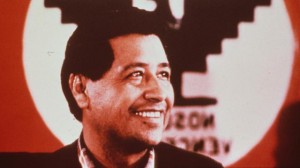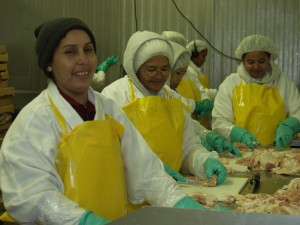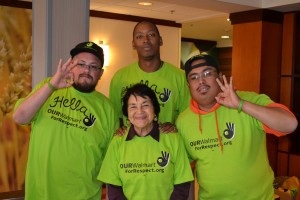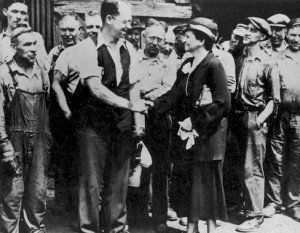March 31, 2014
UFCW Celebrates Women’s History Month and the Future of the Labor Movement
 Women’s History Month has provided us with an opportunity to highlight the lives of Mary Harris “Mother” Jones, Frances Perkins, Dolores Huerta and Addie Wyatt—remarkable women who made significant contributions to the labor movement.
Women’s History Month has provided us with an opportunity to highlight the lives of Mary Harris “Mother” Jones, Frances Perkins, Dolores Huerta and Addie Wyatt—remarkable women who made significant contributions to the labor movement.
These women’s lives have served as an inspiration to today’s female labor activists. From the brave women of OUR Walmart to the women who work in our nation’s meatpacking, food processing, and poultry plants, as well as supermarkets and retail stores, women are taking the lead in fighting for respect and dignity at work and the right to organize for better wages and benefits.
According to the Bureau of Labor Statistics, union membership remains higher for men (11.9 percent) than women (10.5 percent), but the gap is narrowing as women realize the benefits of belonging to a union. In fact, workers who were members of a union in 2013 had median weekly earnings of $950, while workers who were not union members earned $750 per week.
As UFCW members, it is our duty to welcome more women into the labor movement by spreading the word that when workers stick together as a union, they have bargaining power and a collective voice that they simply do not have when they are not unionized. In unity there is strength, and unions can lift us all up by strengthening the middle class and our economy and restoring some balance between the wealthy few and the rest of America.
March 28, 2014
Remembering the legacy of César Chávez
 Eighty seven years ago this Monday, César Chávez, a hero of the labor and civil rights movements, was born on a small ranch in Yuma, Arizona.
Eighty seven years ago this Monday, César Chávez, a hero of the labor and civil rights movements, was born on a small ranch in Yuma, Arizona.
Like thousands of others Chávez’s family lost its land in the Great Depression and headed to work in the fields of California’s central valley, where he would spend the rest of his life fighting for the rights of migrant farmworkers. Growing up, Chavez experienced grinding poverty and rampant discrimination against Mexican Americans. He left school after 8th grade and began working in the fields full time to help support his family, but he never lost his appetite for education, teaching himself about Gandhi’s non-violent strategies for social change.
Chávez’s passion for social justice led him to become a community organizer, registering Latinos to vote so they could fight for their civil rights, but he understood that farmworkers could only win dignity and respect by banding together to form a union in the fields. Even some of Chávez’s allies doubted that Spanish-speaking migrant workers could ever organize successfully, but he led the creation
of the organization that would become the United Farm Workers in 1962.
The organization struggled at first, but in 1965 Filipino workers on grape farms launched a strike demanding wages equal to the federal minimum wage (from which they were excluded) and approached Chávez for support. Chávez inspired Latino workers in the grape i
ndustry to stand in solidarity with the strike, which spread rapidly through the California fields. During the strike, Chávez pioneered unprecedented strategies that have become invaluable to all of us in the labor movement. He led workers in long marches that crossed the state of California to raise awareness of the strike, sent workers and students to cities to lead consumer boycotts
of table grapes, and even put his body on the line in a series of hunger strikes. After a grueling five year campaign, the UFW won the strike and secured living wages and a union voice in the grape fields.
After the triumph in the grape fields, the UFW grew dramatically until it represented more than 50,000 farmworkers, and farmworkers’ right to join together and bargain with their employers was e
nshrined in California law. Chávez continued to lead the UFW and fight for
the rights of workers, immigrants, and Latinos until his untimely death in 1993.
This weekend will see the release of the new movie Cesar Chavez, which document his moving story. You can find more information, including showings near you, here.
March 26, 2014
UFCW President Hansen Urges Support for Discharge Petition on Comprehensive Immigration Reform
 WASHINGTON, D.C.—Joe Hansen, International President of the United Food and Commercial Workers International Union (UFCW), today released the following statement supporting the discharge petition filed by House Democrats which seeks a vote on comprehensive immigration reform.
WASHINGTON, D.C.—Joe Hansen, International President of the United Food and Commercial Workers International Union (UFCW), today released the following statement supporting the discharge petition filed by House Democrats which seeks a vote on comprehensive immigration reform.
“It has been 272 days since the Senate passed comprehensive immigration reform on a bipartisan basis. For nearly 9 months, the House has failed to follow suit. This discharge petition is a way for those who support reform to force a vote on legislation to fix our broken immigration system, protect workers’ rights, reunite families, and give aspiring Americans a path to citizenship. House Republican leaders need to stop making excuses and House Democrats who say they are with us need to make this petition a priority. Our nation deserves comprehensive immigration reform—not tomorrow, not the next day, now. The vast majority of Americans support reform—Republicans, Democrats, business, labor, faith communities, law enforcement, and students, just to name a few. The only thing stopping comprehensive immigration reform from becoming the law of the land is a small group of extremist members of Congress and their enablers. It is time to end the gridlock and hold a vote. Meanwhile, the Obama Administration should immediately stop deporting those who will achieve legal status once reform is passed.”
###
The United Food and Commercial Workers International Union (UFCW) represents more than 1.3 million workers, primarily in the retail and meatpacking, food processing and poultry industries. The UFCW protects the rights of workers and strengthens America’s middle class by fighting for health care reform, living wages, retirement security, safe working conditions and the right to unionize so that working men and women and their families can realize the American Dream. For more information about the UFCW’s effort to protect workers’ rights and strengthen America’s middle class, visit www.ufcw.org, or join our online community at www.facebook.com/UFCWinternational and www.twitter.com/ufcw.
March 20, 2014
UFCW Member Faces Life after Surgery— with Disability Assistance from Union Plus
 From Union Plus
From Union Plus
For 17 years, Michael Roque of Somers Point, N.J.–a member of UFCW Local 152–did a job he was good at, caring for the elderly and bringing joy to their lives. But, after having to undergo brain surgery, the long recovery has brought big changes to his life, along with the financial strain of being unable to work full time. Now regaining his strength, Roque is thankful for the Union Plus Disability Grant1 that provided financial assistance at a critical time.
For much of his career as an activities aid in a nursing home, the symptoms from Roque’s epilepsy were kept in check. But a 2004 car accident left him experiencing three to four seizures a month. Eventually, there was no alternative but to have surgery, even though it would mean a recovery period of a year or more, while getting by on his wife Donalyd’s salary.
Assistance from Union Plus has been a huge help during such a difficult time. “I learned about the Disability Grant by chance,” Roque says. “After I got a Union Plus Credit Card, I started getting emails from Union Plus, and one of them described the Disability Grant program. With everything we were going through, it sounded like it would be great for us.”
Union Plus provides a range of unique assistance programs1 to help eligible UFCW Credit Cardholders who are facing hardship. Disability Grants of $1600 to $2700 are available to Union Plus Credit Card holders who have had the card for three months or more and who meet the eligibility requirements.
“The people at Union Plus were extremely helpful all throughout the application process,” Roque says. “They answered all my questions, stayed in touch, and we received help in less than a month.”
The last year has been a tough time in many ways, but Roque is progressing in his recovery and feeling better than he has in a long time. “I haven’t had a seizure since the surgery,” he says. “I’m getting my strength back each day.”
Roque looks forward to returning to work in the coming months. He may be unable to perform his old job, due to the stress and physical requirements, but with his years of experience and his degree in public health, he is confident of finding a good opportunity where he can put his skills to work.
“My life has changed a lot in the last year,” he says. “But I’m moving ahead now. I really appreciate the help that Union Plus provided when we needed it most.”
Do you carry a Union Plus Credit Card? They feature Disability, Job Loss, Strike, and Hospital Grants for eligible cardholders, plus, a competitive rate and all customer service calls are answered in the U.S. You can learn more by visiting www.UFCWCard.com
Also available to eligible UFCW members is the Union Plus Mortgage program, which provides a range of assistance programs, including interest-free loans and grants to help you make mortgage payments when you’re disabled, or become unemployed. Over the life of the Union Plus mortgage assistance program, more than $10.1 million in assistance has been provided to union members.
At UnionPlus.org you can learn more about these programs, as well as the Union Plus benefits and services that are available to union members and retirees. These include legal services, credit counseling, health savings programs, and the Save My Home Hotline.
# # #
1Certain restrictions, limitations, and qualifications apply to these grants. Additional information and eligibility criteria can be obtained at UnionPlus.org/Assistance.
Credit approval required. Terms & Conditions apply. Union Plus Credit Cards issued by Capital One, N.A.
March 20, 2014
Women’s History Month: UFCW Celebrates the Life of Dolores Huerta
“I think organized labor is a necessary part of democracy. Organized labor is the only way to have fair distribution of wealth.”
(Dolores Huerta)
Dolores Clara Fernandez, better known as Dolores Huerta, was born in 1930 in New Mexico, and grew up in the farming community of Stockton, California. She earned a teaching degree at Delta Community College. During that time, she met her first husband. She later married Ventura Huerta. In the early 1950s, she worked as an elementary school teacher, and many of her students were the children of farm workers who were living in poverty. Teaching the children of farm workers had a profound impact on her, and in 1955, she became one of the founders of the Stockton chapter of the Community Services Organization (CSO), which worked to improve social and economic conditions for farm workers and fight discrimination. Through her work at the CSO, she met Cesar Chavez.
In 1960, she helped create the Agricultural Worker’s Association (AWA), and in 1962, she and Chavez launched the National Farm Workers Association (NFWA), the predecessor to the United Farm Workers Union (UFW).
In 1965, she helped to organize the historic Delano Grape Strike and consumer boycott against growers of table grapes in California. The strike involved thousands of grape workers and was a significant victory for the UFW—leading to a first contract with these growers. In 1967, the NFWA combined with the AWA to create the United Farm Workers Organizing Committee. During this time, she negotiated contracts for workers, fought against the use of harmful pesticides, and advocated for unemployment and healthcare benefits for agricultural workers. In 1973, she led another successful consumer boycott against California grape growers that resulted in the California Agricultural Labor Relations Act of 1975, which allowed farm workers to form unions and bargain for better wages and working conditions.
Dolores Huerta stepped down from her position at the UFW in 1999, and established a foundation where she continues her work to improve the lives of workers, immigrants and women. She has received many honors for her activism, including the Presidential Medal of Freedom in 2012. She is portrayed by Rosario Dawson in the film “Cesar Chavez,” which screened at the White House this week.
To learn more about Dolores Huerta, follow her on Twitter (@DoloresHuerta) or visit her foundation’s website at http://doloreshuerta.org/.
March 19, 2014
Women’s History Month: UFCW Celebrates the Life of Frances Perkins
“I came to Washington to work for God, FDR, and the millions of forgotten, plain common workingmen.”
(Frances Perkins)
Frances Perkins (1880-1965) graduated from Mount Holyoke in 1902 and earned a Master’s Degree in sociology from Columbia University in 1910. After graduate school, she worked as a social worker and became involved in labor reform efforts after witnessing workers trying to escape from the cramped floors of the Triangle Shirtwaist Factory in 1911.
She served as the first woman Industrial Commissioner under New York Governor Franklin Roosevelt, and held other important labor-related jobs in New York state government under Governors Roosevelt and Al Smith. In 1933, President Roosevelt appointed her as his Secretary of Labor—making her the first woman to hold a U.S. Cabinet position.
As Secretary of Labor, Frances Perkins championed many aspects of the New Deal, including unemployment insurance, child labor laws, and the adoption of the federal minimum wage. She was largely responsible for the creation of the Social Security system through her role on the President’s Committee on Economic Security. Following her service as Secretary of Labor, she was asked by President Truman to serve on the U.S. Civil Service Commission. She resigned from public service in 1952 shortly after the death of her husband, Paul Caldwell Wilson.
Following her government service career, she continued to be active as a teacher and lecturer until her death. The Frances Perkins Building that serves as the headquarters of the U.S. Department of Labor was named in her honor in 1980.
###
March 13, 2014
President Obama, flanked by UFCW Member, Pushes to Expand Overtime Pay
 President Obama today ordered the Department of Labor to expand federal rules so that more salaried workers would be able to qualify for overtime pay. Currently, any salaried employee making more than $455 per week is not required to be given overtime pay when they work more than 40 hours in a week.
President Obama today ordered the Department of Labor to expand federal rules so that more salaried workers would be able to qualify for overtime pay. Currently, any salaried employee making more than $455 per week is not required to be given overtime pay when they work more than 40 hours in a week.
The current $455 per week salary threshold has failed to keep pace with inflation. It was $250 in 1975, equivalent to roughly $1,000 today.
This expansion will give millions more workers across the nation the chance to earn extra pay when they do extra work.
UFCW Local 400 member Rob Trotter, a meat cutter at Giant in Annandale, stood next to President Obama as he signed the memorandum.
“I have worked in retail for over twenty years for an hourly wage,” he said. “I have depended upon overtime to pay school tuition for my children, upgrade a family vacation, or to get out from under a financial hardship. The opportunity to earn overtime has always been helpful and comforting to me.”
It is not yet clear by how much the salary threshold will increase. The President’s order instructs the Department of Labor to come up with an expansion plan following a period of input and study. With the stagnation of wages and the increase in corporate profits, actions like this give workers a better chance to provide for their families.
“There have been years when twenty percent of my income was comprised of overtime,” Trotter said. “Going above and beyond expectations at work takes a toll physically because you’re working harder and emotionally because you’re away from your family for a longer period of time. Every employer should fairly recognize and reward this sacrifice.”
March 11, 2014
UFCW Celebrates Women’s History Month
 The month of March marks Women’s History Month and provides us with an opportunity to honor the many women who have who have fought for social and economic justice in the workplace.
The month of March marks Women’s History Month and provides us with an opportunity to honor the many women who have who have fought for social and economic justice in the workplace.
From Mary Harris “Mother” Jones, the “grandmother of all agitators,” to Frances Perkins, the first woman to serve in the U.S. Cabinet as Secretary of Labor, to Dolores Huerta, co-founder of the National Farm Workers Association, to Addie Wyatt, the first African-American woman elected international vice president of a major labor union, to the brave women of the Organization United for Respect at Walmart (OUR Walmart), women in the labor movement have defied convention and taken the lead in fighting for workers’ rights.
Throughout out the month of March, the UFCW will the highlight the lives of these remarkable women who fought for fair wages, dignity in the workplace and the freedom to organize in spite of considerable barriers, and honor their significant contributions to the labor movement.
March 6, 2014
UFCW States Council, Locals and Members Meet California Lawmakers on Lobby Day
Special Guest Post From http://www.ufcwwest.org/
UFCW members and locals were out in force yesterday at the state Capitol in Sacramento wearing UFCW blue and gold and handing out reusable plastic bags to show California legislators that we will be paying attention to issues that affect working families this year.
 The States Council, along with members and leaders from locals 135, 1167, 1442, 324, 1428, 648, 770, 5 and 8 met at the offices of the California Labor Federation at 9:15am for a quick rallying point before making our way to Speaker Perez’s caucus room for an address and update by legislators’ staff on issues that union members care about. UFCW then filtered out to the halls of the Capitol for meetings with key district legislators and their staff on two important bills that UFCW will be pushing for this year: SB270 and AB1792.
The States Council, along with members and leaders from locals 135, 1167, 1442, 324, 1428, 648, 770, 5 and 8 met at the offices of the California Labor Federation at 9:15am for a quick rallying point before making our way to Speaker Perez’s caucus room for an address and update by legislators’ staff on issues that union members care about. UFCW then filtered out to the halls of the Capitol for meetings with key district legislators and their staff on two important bills that UFCW will be pushing for this year: SB270 and AB1792.
 SB270, which would ban single-use plastic bags in grocery stores and pharmacies across California, is a bill co-authored by Senator Kevin de León and Senator Alex Padilla and supported by UFCW in partnership with the California Grocers Association. The bill creates a statewide standard for banning plastic bags, rather than the patchwork of existing local ordinances, and will reduce costs, protect jobs and help cleanup the environment. As UFCW met with lawmakers on this important bill, members and leaders passed out reusable plastic bags with our UFCW brand and CGA’s logo, and there were many sightings of the bag across the Capitol as the day went on.
SB270, which would ban single-use plastic bags in grocery stores and pharmacies across California, is a bill co-authored by Senator Kevin de León and Senator Alex Padilla and supported by UFCW in partnership with the California Grocers Association. The bill creates a statewide standard for banning plastic bags, rather than the patchwork of existing local ordinances, and will reduce costs, protect jobs and help cleanup the environment. As UFCW met with lawmakers on this important bill, members and leaders passed out reusable plastic bags with our UFCW brand and CGA’s logo, and there were many sightings of the bag across the Capitol as the day went on.
UFCW also put out the word about AB 1792, the Public Benefit Disclosure Bill authored by Assemblymember Jimmy Gomez. AB1792 is a bill that would be a step in the right direction for the State, capturing data about the number of workers receiving public assistance in both the private and public sectors in order to create accountability. The Council believes that some very large employers — Walmart being the biggest — are taking advantage of a loophole in the President’s Federal Health Insurance Program that encourages bad players to reduce workers’ weekly hours, pay low wages and deliberately push their workers unto the state’s Medi-Cal program for health insurance. UFCW members and leaders asked their legislators what they would be doing to ensure that these companies pay their fair share and protect individual taxpayers from increased taxes, and our hope is that lawmakers will feel accountable to this question in the months to come.

The day was a big success for the union, and we feel that by coming out early and often on these issues, we can push lawmakers to support our priority bills and future UFCW-sponsored legislation. Stay tuned for an announcement of the next States Council lobby day in March, and for updates on these bills and upcoming political fights coming soon.
February 27, 2014
Congressional Budget Office: 40 Hours Bill Could Cost 1 Million Workers Their Health Care
Check out this blog from the AFL-CIO which highlights a new Congressional Budget Office (CBO) report showing that H.R. 2575, the misleadingly named Save American Workers Act, could cost 1 million workers their employer provided health care.



